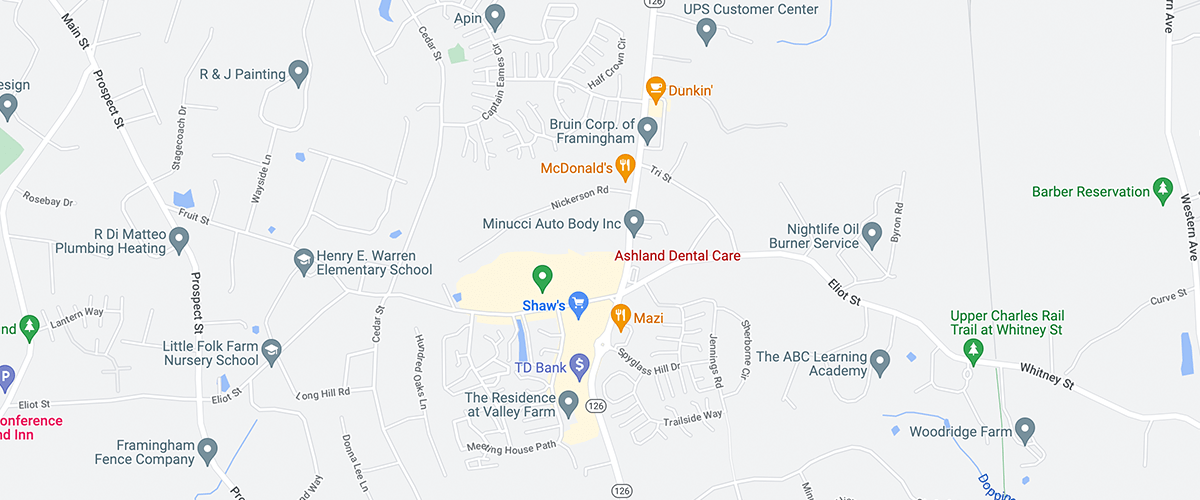December 7th, 2023

Oral cancer is largely viewed as a disease that affects those over the age of 40, but it can affect all ages, even non-tobacco and alcohol users. Oral cancer can occur on the lips, gums, tongue, inside lining of the cheeks, roof of the mouth, and the floor of the mouth. Our team at Ashland Dental Care recently put together some facts and figures to illustrate the importance of visiting our Ashland office.
Our friends at the American Cancer Society recommend an oral cancer screening exam every three years for people over the age of 20 and annually for those over age 40. Because early detection can improve the chance of successful treatment, be sure to ask our doctor and our team to conduct an oral exam during your next visit to our Ashland office.
- Symptoms of oral cancer may include a sore in the throat or mouth that bleeds easily and does not heal, a red or white patch that persists, a lump or thickening, ear pain, a neck mass, or coughing up blood. Difficulties in chewing, swallowing, or moving the tongue or jaws are often late symptoms.
- The primary risk factors for oral cancer in American men and women are tobacco (including smokeless tobacco) and alcohol use. Risk rises dramatically (30%) for people who both smoke and consume alcohol regularly.
- Oral cancers are part of a group of cancers commonly referred to as head and neck cancers, and of all head and neck cancers they comprise about 85% of that category.
- Oral cancer is the sixth most common cancer among men.
- Oral cancer is more likely to affect people over 40 years of age, though an increasing number of young people are developing the condition.
- Death rates have been decreasing over the past three decades; from 2004 to 2008, rates decreased by 1.2% per year in men and by 2.2% per year in women, according to the American Cancer Society.
- About 75% to 80% of people with oral cavity and pharynx cancer consume alcohol.
- The risk of developing oral cavity and pharynx cancers increases both with the amount as well as the length of time tobacco and alcohol products are used.
- For all stages combined, about 84% of people with oral cancer survive one year after diagnosis. The five- and ten-year relative survival rates are 61% and 50%, respectively.
- It is estimated that approximately $3.2 billion is spent in the United States annually on treatment of head and neck cancers.
Cancer can affect any part of the oral cavity, including the lip, tongue, mouth, and throat. Through visual inspection, our doctor and our team at Ashland Dental Care can often detect premalignant abnormalities and cancer at an early stage, when treatment is both less extensive and more successful.
Please let us now if you have any questions about your oral health either during your next scheduled appointment, by giving us a call or asking us on Facebook.
November 29th, 2023

You have a lot more freedom as a teenager than you did as a young child. You also have a lot more responsibilities, and one of your jobs is to take care of your teeth. Develop and maintain good dental habits now so you can have great dental health for life!
Tooth Decay
As a teenager, you risk tooth decay, or dental cavities, if you are not careful. In fact, 59% of adolescents aged 12 to 19 have at least one cavity, according to the National Institute of Dental and Craniofacial Research. our doctor and our staff recommend keeping your teeth strong and healthy by brushing at least twice a day and flossing every day.
If you suspect that you have tooth decay, do not be embarrassed. Instead, ask your parents to bring you to Ashland Dental Care to get it looked at. When you do not treat your dental cavities, they can turn into more serious problems. A severely damaged tooth may need to be treated with a root canal or even an extraction.
You can take easy steps to prevent tooth decay when you are at school or hanging out with your friends. Carry a bottle of water around with you so you can take a sip after you eat any kind of food. Choose water or milk instead of soda or sports drinks, and if you chew gum, select a sugar-free flavor.
Other Oral Health Concerns
You can probably think of many reasons why you should not smoke or use tobacco. Your oral health is another one. Tobacco gives you bad breath and stains your teeth yellow. It also increases your risk for gum disease and cancer of the mouth. Smoking even slows the speed of healing after you have dental procedures done.
Here are a few more tips that can keep your mouth attractive and healthy during your teen years.
- Drink plenty of milk.
- Limit candies and sugary snacks.
- Wear a mouthguard if you play a contact sport.
- Visit Ashland Dental Care twice a year.
- Reduce infections and avoid piercing your tongue and lips.
You only get one set of permanent teeth in your life, so get in the habit of taking care of them now!
November 29th, 2023

“Shouldn’t that be healthy gums,” you’re thinking? And, of course, you’re correct. Healthy gums are extremely important not only for our dental well-being, but for our overall physical health.
But that’s a subject for another blog! Today, we’re talking about healthy gum—chewing gum, that is. Because choosing the right chewing gum can actually improve your dental health.
Oral bacteria use the foods we eat, especially sugars and simple carbs, as fuel to produce acid. These acids attack our tooth enamel, gradually weakening the minerals in the tooth surface and allowing cavities to develop. Clearly, we want to reduce these acids to help prevent decay. Luckily, our bodies have a natural defense against acid attacks—saliva.
Saliva works to protect our enamel in three ways:
- It helps neutralize and wash away acids in the mouth.
- It rinses away the food particles which bacteria feed on.
- It strengthens teeth by providing the necessary minerals our enamel needs to “remineralize” after acids have weakened the tooth surface.
Studies have concluded that chewing sugarless gum for 20 minute after a meal can help prevent cavities. Why? Because chewing gum increases saliva production. You are actually reducing the effects of harmful acids, washing food particles away from your teeth, and strengthening weakened enamel with every stick! Some artificial sweeteners are even thought to inhibit the growth of the bacteria that lead to decay.
With all that in mind, it’s also healthy to know when you shouldn’t chew gum:
- When the gum contains sugar. Even with an increase in saliva production, bathing your teeth in sugar as you chew does your enamel no favors!
- When you wear braces. Gum can stick to your brackets and between your brackets and your wires. And while trying to clean gum from your appliance is no one’s idea of fun, an even more unpleasant possibility is the chance that gum might bend your wires out of shape. Sugarless gum is not quite as sticky as regular gum, but before you open that first pack, check with your orthodontist to see if you might be putting your orthodontic work at risk.
- When you have jaw problems such as TMD, TMJ or other temporomandibular concerns, or if you develop jaw pain while chewing gum.
- You should never give gum to a child too young to understand that it should not be swallowed. Beyond acting as a choking hazard, continual gum swallowing can lead to diarrhea, blockages, abdominal pain and other serious problems. Talk to your our doctor about the right age for chewing gum.
While chewing sugarless gum has the potential to improve dental health, remember it should never take the place of regular brushing and flossing—still the best way to prevent cavities at home. Talk to our doctor about the possible benefits of sugarless gum at your next visit to our Ashland office, and we can make recommendations based on your individual dental history. Because whether it’s healthy gums or healthy gum, we’re here to help.
November 22nd, 2023

Creating good dental hygiene habits early in your child’s life is essential to the health of his or her teeth, even when your infant doesn’t have any. By starting now, you can set the foundation for your son or daughter’s oral health later on in life.
When do I start?
The best time to begin brushing your baby’s teeth is before that first tooth ever comes in. Wipe your little one’s gums gently with a soft washcloth soaked in warm water every day. Not only will this help to get rid of bacteria in the mouth, but it will also familiarize your child with a daily brushing routine.
What do I use?
When your child’s teeth begin to emerge, it’s time to switch to a baby toothbrush. Select one with a big grip for your hand and a small head that’s easy to maneuver in your baby’s mouth.
Your little one won’t need toothpaste until he or she is about a year old; and even then, only a small amount is necessary. Apply an amount the size of a grain of rice and move to a pea-sized amount when your infant is about two years old.
By around six years, your child will probably rinse and spit without your help. At this time, you may introduce a child-friendly fluoride mouthwash.
How do I do it?
Until about age five or six, it’s likely your child will still need your help with brushing teeth. Gently scrub over all the teeth and gums, even where teeth have yet to come in. It may be helpful to explain what you are doing and how you are doing it, so your toddler can learn to brush her or his teeth alone.
Paired with regular visits with our doctor at our Ashland office, proper hygiene habits instilled in your child early on will set up a good foundation for a healthy mouth in the future.




